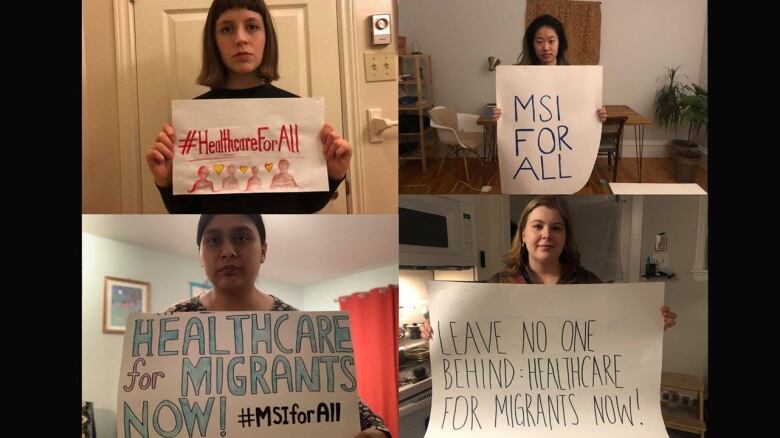Vulnerable groups need special support during COVID-19: advocates
Existing social inequities being made worse during pandemic, advocates say

Some advocates who work with vulnerable groups in society are putting out a stark reminder that those people are also some of the most vulnerable to being harmed by COVID-19.
Newcomers to Canada, undocumented workers, those on low incomes or who have inadequate housing may need special supports, say people who advocate on their behalf.
"Any inequities and problems that existed in our society before have not disappeared now. And in some cases, are often being made worse by some of the policies that have been put in place," said Dr. Monika Dutt, who works as a family physician and in public health, and at the Ally Centre clinic in Sydney, N.S.
Dutt notes that while public health messaging is good, for some it is challenging or impossible to follow those messages.
"Even simple instructions like telling people, you know, play in your backyard, don't go very far but if you don't have a backyard that makes it really hard, especially you know, for yourself, for your kids," she said.
On Thursday, a resident of a Halifax pop-up shelter tested positive for the virus. The province has responded by moving everyone from the shelter into a hotel to self-isolate.
"As a family physician I work at a centre that does work predominantly with people who do lack access to housing, who do have issues around drug use and so are already facing a lot of barriers. And now you add this on top of that, it just makes it even more difficult when you already have little to no income," Dutt said.
"Now you're even more isolated than you were before. That makes it more challenging."

Stacey Gomez, a member of the Halifax-based group No One Is Illegal, has been advocating for better benefits and health care for groups such as undocumented workers.
"They're often [invisible] members of our community, but they're part of our community," she said in a telephone interview. "That includes undocumented people, asylum seekers, migrant workers, international students."
Gomez said she feels some of these groups are particularly vulnerable to COVID-19. An estimated 200,000 to 500,000 people live in Canada without health insurance.
Some do not qualify for subsidies like the federal government's emergency response benefit.
"Undocumented people often work in service industries including cleaning and restaurants," Gomez added by email.
"They often have a lack of work protections and could face increased exposure because of where they're working. They are also likely not able to work at home, in self-isolation. They take care of us and we need to take care of them by ensuring health care for all."
The Canadian government has announced guidelines for temporary foreign workers that state an employer must provide safe accommodations for self-isolating, and providehealth-care coverage until the workers become eligible for provincial health care.
Gomez said while this is a good step, it is not clear what would happen if employers failed to live up to their responsibilities, or how migrant workers could make a complaint against their employers.
Access to language services
Families who have recently moved to Canada may also face additional challenges. Jennifer Watts, the CEO of the Immigrant Services Association of Nova Scotia, said her organization has identified about 800 of its approximately 9,500 clients who need the greatest amount of support.
Some of those clients include people who are at a beginner level of English, recently arrived, are single parents in need of support, people who are without community resources, people with disabilities, chronic or complex health issues, or people with very large families such as nine or 10 children in one household.
"Everyone is kind of experiencing this fear and concern for family and friends, but the complications for newcomers, particularly those who've most recently arrived, are there's more additional complexity to that," Watts said.
"Any time you're dealing with a health concern in a new language, no matter whether you even have some facility in English, it's just way, way, way harder."
ISANS has worked hard to provide translations of basic public health information, and continues to deliver its language learning programs through services like Zoom, WhatsApp andFaceTime, and through hundreds of paper packages mailed to clients' homes.
Worried about family
Watts saidISANS has been able to keep working with about 75 to 80 per cent of its language clients, although some are too overwhelmed to continue lessons at this point.
Some ISANS clients are trying to cope with the pandemic without the support of any extended family in Canada, and sometimes with the additional worry about family members in countries without a strong medical system.
"Many times their family and friends are back in countries where they're being dramatically affected by COVID, or in refugee camps that are very susceptible to major outbreaks of COVID. So it's just very, very worrisome for families," Watts said.
Watts said it's important to remember that many newcomers to Nova Scotia are professionals who have studied overseas such as doctors, dentists, nurses, and pharmacists who are ready and willing to help. As well, many newcomers came to Canada to work in nursing homes and hospitals.
"The people that are here, that have arrived and have brought so much promise and opportunity to our province [it's important] that they know that they're not alone right now and that we're remembering them and keeping them in our thoughts," she said.
MORE TOP STORIES












_(720p).jpg)


 OFFICIAL HD MUSIC VIDEO.jpg)
.jpg)



























































































